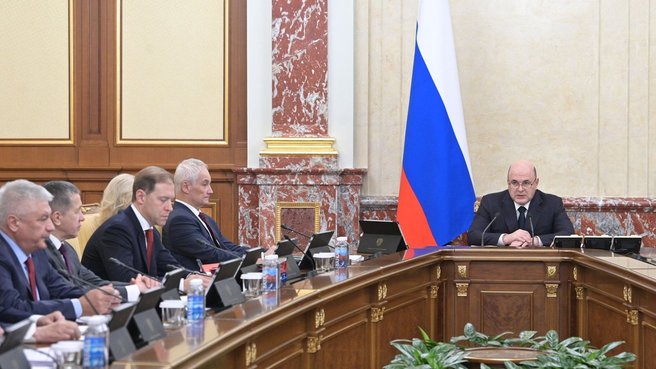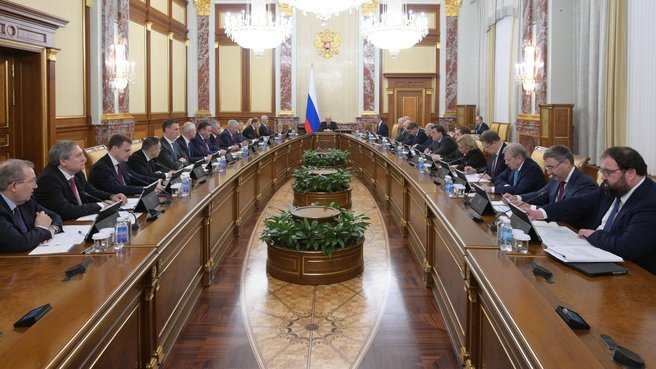The agenda: results of a working visit to China, support for the automotive industry, support for high-tech investment projects, financing road construction, and establishing international priority development areas in the Far Eastern Federal District.
Mikhail Mishustin’s opening remarks:
Good afternoon, colleagues,
This week a government delegation paid a working visit to China.
The conversation with the President of the People's Republic of China Xi Jinping was of great importance. He conveyed his warmest greetings to President of Russia Vladimir Putin. He reaffirmed the Chinese leadership's principled course towards further strengthening the comprehensive partnership and strategic cooperation between Russia and China.
My colleague, Mr Li Qiang, Premier of the People's Republic of China, and I also held a regular meeting of heads of government. We discussed the most significant and topical issues of bilateral cooperation and, of course, implementation of the agreements reached at the top level.
We thoroughly reviewed the key items on the economic, investment, energy and humanitarian agenda. We reached concrete decisions on the further promotion of our practical cooperation, including expansion of access to the Chinese market for Russian products, primarily agricultural products. We agreed to work on new joint projects in energy, industry, transport infrastructure and many other areas of joint interest.
We will do everything necessary to further strengthen bilateral ties, honouring the agreements of our leaders, Vladimir Putin and Xi Jinping.
I ask my colleagues to closely monitor the implementation of the decisions taken during the visit.
Yesterday, at the meeting of the Council for Strategic Development and National Projects chaired by the President, we spoke in detail about the need to clarify national development goals, expand the planning horizon, and prepare and launch updated national projects in a timely manner. We need to consolidate the positive dynamics of investment and the economy as a whole and ensure sufficient supply for the growing demand of the domestic market.
The President noted that at least 2 trillion rubles should be invested in projects to produce priority products by the end of this year. He stressed that a good incentive for industry is, among other things, the renewal of public transport in the regions. We will reduce the average age of the fleet by adding new buses, trolleybuses, trams and electric buses. We will continue to pay attention to other important areas.
Before we move on to the agenda, I will speak about the Government's decision on the automotive industry. We will provide it with additional support to help our enterprises develop the missing competences in a short period of time and fully guarantee stable functioning of assembly lines in under the sanctions.
The President has instructed us to expedite the development and production of the entire range of critical automotive components.
About 39 billion roubles have been additionally allocated to the Industrial Development Fund. A significant portion of these funds will be used to implement key projects among leading domestic automakers, including on promising research, development and engineering.
The auto industry’s plans are ambitious. It is extremely important that Russian cars meet today’s technical requirements accepted in the world and are on par with foreign models in terms of reliability.
Today’s agenda includes the issue of expanding state support for enterprises.
Under the external pressure, we need to continue to increase our own production and develop and introduce breakthrough technologies and innovations, as well as to fulfil the goal set by the President to achieve technological sovereignty in the shortest possible time.
In order to do this, the Government will allocate more than 7.5 billion roubles for additional capitalisation of the Industrial Development Fund. The funds will help finance the creation of an additional range of key knowledge-intensive products that are not yet produced in Russia.
Thanks to the decisions already made, over 200 such investment projects worth about 100 billion roubles were supported over 11 months of this year. In general, the volume of concessional loans issued by the fund is now approaching half a trillion roubles.
We will continue to pay special attention to such areas as transport engineering, chemical and light industry, machine tool building, and radio electronics.
The meeting agenda also includes an entire block of issues related to the construction of roads and related infrastructure. We will redistribute about 570 million roubles between regions.
Additional funding will be allocated to three republics: Adygea, Kabardino-Balkaria, and Crimea, as well as two regions: Arkhangelsk and Ryazan.
In Adygea, resources will be used to accelerate the construction of the Guzeripl-Lagonaki Plateau section in the Maykop District. In Kabardino-Balkaria, to renovate part of the Chegem-2 to Bulungu motorway with a bridge over the river. In the Arkhangelsk Region, for major repairs to the route leading to the Komi Republic. All three are included in the Safe and High-Quality Roads national project which is being implemented as part of achieving the goals set by the President.
We will also allocate almost 710 million roubles to ensure the proactive construction of the M-7 Moscow-Vladimir-Nizhny Novgorod-Kazan-Ufa federal motorway, in particular for building bypasses around the cities of Nizhnekamsk and Naberezhnye Chelny.
Today’s decisions are expected to have a positive impact on work dynamics and to ensure access to high-quality road infrastructure for the people in these regions, including remote villages. Also, related industries will work at full capacity, and other projects, including in the field of tourism and global trade, will be implemented.
The next item concerns the Far East. Yesterday, at the meeting of the Council for Strategic Development and National Projects, the President drew particular attention to the need to achieve the goals on the urban development master plans for the cities in this large region, as well as to create an integral system for managing the development of towns, and to unite all mechanisms for supporting the Russian regions in this area. And it is necessary, primarily for the people there, to use effective control tools. This kind of work needs to be done quickly.
As the President previously noted, it is important for Russia that the Far Eastern regions have modern living conditions for people, that their incomes grow, that their well-being improves, and high-quality jobs and efficient industries are created. To stimulate business activity in these territories, the Government has already introduced preferential programmes. This includes the free port of Vladivostok and special benefits for the Kuril Islands, and in the Arctic zone. Investors also enjoy tax and customs exemptions, a simplified procedure to receive land plots and infrastructure, thanks to which ambitious projects are implemented in various industries and areas, including shipbuilding, clean energy, natural gas conversion and many others.
Today we will discuss the measures needed to attract our partners from friendly states to this large region. I mean creating international priority development areas in the Far Eastern Federal District, and Russian companies, including those with foreign capital, that can launch the production of high-tech products and invest at least half a billion roubles, will be able to participate in the project. They will be eligible for profit tax exemption for 10 years – this is twice as long as existing priority development areas, as well as for exemptions from land and property taxes. We hope that the decisions taken will create comfortable conditions for business activity and that more industrial enterprises will be launched to produce goods.













